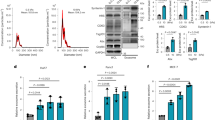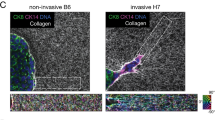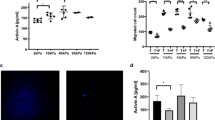Abstract
The extracellular, matrix-modifying enzyme lysyl oxidase (LOX) has recently been linked to colorectal cancer (CRC) progression, in particular to the stages of invasion and metastasis. In this report, we use cell lines expressing a catalytically inactive mutant form of LOX to show that catalytic activity is required for LOX-mediated effects on proliferation and invasion in both in vitro and in vivo models of CRC. Furthermore, we use rheology to measure the relative stiffness of modified collagen matrices and subcutaneous tumors, and show that LOX-induced collagen cross-linking results in stiffening of the matrix both in vitro and in vivo. We observe a strong association between matrix stiffness and activation of the FAK (focal adhesion kinase)/SRC-signaling pathway, with a stiffer environment resulting in increased FAK/SRC phosphorylation and a more proliferative and invasive phenotype. We are the first to show a direct relationship between LOX enzymatic activity and tissue stiffness, and to demonstrate a role for stiffness in driving CRC progression. Our findings provide significant evidence to suggest that therapeutic inhibition of LOX activity may provide a novel effective treatment option for patients with metastatic CRC.
This is a preview of subscription content, access via your institution
Access options
Subscribe to this journal
Receive 50 print issues and online access
$259.00 per year
only $5.18 per issue
Buy this article
- Purchase on Springer Link
- Instant access to full article PDF
Prices may be subject to local taxes which are calculated during checkout




Similar content being viewed by others
References
Suresh S . Biomechanics and biophysics of cancer cells. Acta Biomater 2007; 3: 413–438.
Paszek MJ, Zahir N, Johnson KR, Lakins JN, Rozenberg GI, Gefen A et al. Tensional homeostasis and the malignant phenotype. Cancer Cell 2005; 8: 241–254.
Levental KR, Yu H, Kass L, Lakins JN, Egeblad M, Erler JT et al. Matrix crosslinking forces tumor progression by enhancing integrin signaling. Cell 2009; 139: 891–906.
Erler JT, Bennewith KL, Nicolau M, Dornhofer N, Kong C, Le QT et al. Lysyl oxidase is essential for hypoxia-induced metastasis. Nature 2006; 440: 1222–1226.
Baker AM, Cox TR, Bird D, Lang G, Murray GI, Sun XF et al. The role of lysyl oxidase in SRC-dependent proliferation and metastasis of colorectal cancer. J Natl Cancer Inst 2011; 103: 407–424.
Le QT, Harris J, Magliocco AM, Kong CS, Diaz R, Shin B et al. Validation of lysyl oxidase as a prognostic marker for metastasis and survival in head and neck squamous cell carcinoma: Radiation Therapy Oncology Group trial 90-03. J Clin Oncol 2009; 27: 4281–4286.
Tilghman RW, Parsons JT . Focal adhesion kinase as a regulator of cell tension in the progression of cancer. Semin Cancer Biol 2008; 18: 45–52.
Ishizawar R, Parsons SJ . c-Src and cooperating partners in human cancer. Cancer Cell 2004; 6: 209–214.
Payne SL, Fogelgren B, Hess AR, Seftor EA, Wiley EL, Fong SF et al. Lysyl oxidase regulates breast cancer cell migration and adhesion through a hydrogen peroxide-mediated mechanism. Cancer Res 2005; 65: 11429–11436.
Csiszar K, Fong SF, Ujfalusi A, Krawetz SA, Salvati EP, Mackenzie JW et al. Somatic mutations of the lysyl oxidase gene on chromosome 5q23.1 in colorectal tumors. Int J Cancer 2002; 97: 636–642.
Kim Y, Roh S, Park JY, Cho DH, Kim JC . Differential expression of the LOX family genes in human colorectal adenocarcinomas. Oncol Rep 2009; 22: 799–804.
Baker AM, Cox TR, Bird D, Lang G, Murray GI, Sun XF et al. The role of lysyl oxidase in SRC-dependent proliferation and metastasis of colorectal cancer. J Natl Cancer Inst 2011; 103: 407–424.
Pez F, Dayan F, Durivault J, Kaniewski B, Aimond G, Le Provost GS et al. The HIF-1-inducible lysyl oxidase activates HIF-1 via the Akt pathway in a positive regulation loop and synergizes with HIF-1 in promoting tumor cell growth. Cancer Res 2011; 71: 1647–1657.
Girton TS, Oegema TR, Tranquillo RT . Exploiting glycation to stiffen and strengthen tissue equivalents for tissue engineering. J Biomed Mater Res 1999; 46: 87–92.
Golubovskaya VM, Nyberg C, Zheng M, Kweh F, Magis A, Ostrov D et al. A small molecule inhibitor, 1,2,4,5-benzenetetraamine tetrahydrochloride, targeting the y397 site of focal adhesion kinase decreases tumor growth. J Med Chem 2008; 51: 7405–7416.
Barkan D, El Touny LH, Michalowski AM, Smith JA, Chu I, Davis AS et al. Metastatic growth from dormant cells induced by a col-I-enriched fibrotic environment. Cancer Res 2010; 70: 5706–5716.
Sinkus R, Lorenzen J, Schrader D, Lorenzen M, Dargatz M, Holz D . High-resolution tensor MR elastography for breast tumour detection. Phys Med Biol 2000; 45: 1649–1664.
Samuel MS, Lopez JI, McGhee EJ, Croft DR, Strachan D, Timpson P et al. Actomyosin-mediated cellular tension drives increased tissue stiffness and beta-catenin activation to induce epidermal hyperplasia and tumor growth. Cancer Cell 2011; 19: 776–791.
Colpaert C, Vermeulen P, Van Marck E, Dirix L . The presence of a fibrotic focus is an independent predictor of early metastasis in lymph node-negative breast cancer patients. Am J Surg Pathol 2001; 25: 1557–1558.
Acknowledgements
We would like to thank the staff of the BSU and histopathology departments at the Institute of Cancer Research for assistance with in vivo work and processing of tissue samples. Funding was provided by the Medical Research Council (G0800102 to AMB), the Institute of Cancer Research (JTE), Cancer Research UK (C107/A10433 to TRC, DB, GL and JTE) and BRIC (TRC and JTE).
Author information
Authors and Affiliations
Corresponding author
Ethics declarations
Competing interests
The authors declare no conflict of interest.
Additional information
Supplementary information accompanies the paper on the Oncogene website
Rights and permissions
About this article
Cite this article
Baker, AM., Bird, D., Lang, G. et al. Lysyl oxidase enzymatic function increases stiffness to drive colorectal cancer progression through FAK. Oncogene 32, 1863–1868 (2013). https://doi.org/10.1038/onc.2012.202
Received:
Revised:
Accepted:
Published:
Issue Date:
DOI: https://doi.org/10.1038/onc.2012.202
Keywords
This article is cited by
-
Role of the mechanical microenvironment on CD-44 expression of breast adenocarcinoma in response to radiotherapy
Scientific Reports (2024)
-
Extracellular matrix remodeling in tumor progression and immune escape: from mechanisms to treatments
Molecular Cancer (2023)
-
Biophysics in tumor growth and progression: from single mechano-sensitive molecules to mechanomedicine
Oncogene (2023)
-
Cell–extracellular matrix mechanotransduction in 3D
Nature Reviews Molecular Cell Biology (2023)
-
The biophysical property of the limbal niche maintains stemness through YAP
Cell Death & Differentiation (2023)



